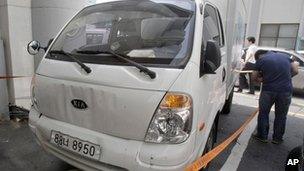Japan anger after protester rams truck at embassy in South Korea
- Published

A South Korean man rammed his truck against the Japanese embassy's gate
Japan has filed a formal diplomatic protest with South Korea after a man rammed his truck against the gate of its embassy in Seoul.
The South Korean driver, who was later detained, reportedly told police he was protesting against Japan's claims to islands controlled by South Korea.
Japan's embassy has been a focal point for protests on long-standing disputes between the two countries.
South Korea has said it regrets the latest incident.
The islands, called Dokdo in Korean and Takeshima in Japanese, are claimed by both but controlled by South Korea.
The man, believed to be in his 60s, damaged the gate of the embassy but did not hurt anyone.
"After the incident, the Japanese embassy in South Korea this morning lodged a strong protest to the South Korean Foreign Ministry, and requested that preventive measures be taken," said Osamu Fujimura, Japanese chief cabinet secretary, at a news conference in Tokyo.
"The Korean government expressed regrets to the Japanese Embassy in Seoul over the incident and will take necessary measures, including tighter security near the embassy," a senior official, from South Korea's Foreign Ministry, was quoted by news agency Yonhap as saying.
South Korea and Japan share a dark past. For 35 years up until the end of World War II, Japan was the harsh colonial ruler of the entire Korean peninsula, and some Koreans still harbour deep resentment, analysts say.
South Korean demonstrators have held rallies since 1992 outside the embassy to demand an apology and compensation from Japan.
Activists unveiled a statue of a young woman outside the embassy in protest last year to represent women who worked as sex slaves in military brothels in wartime Japan.
A few weeks ago, a Japanese activist planted a stake next to the statue, saying that Dokdo belonged to Japan.
- Published20 January 2011
- Published14 December 2011
- Published15 July 2011